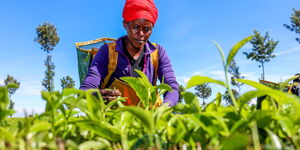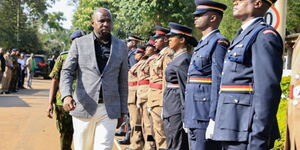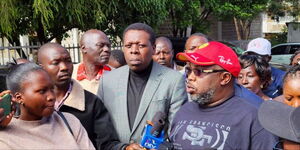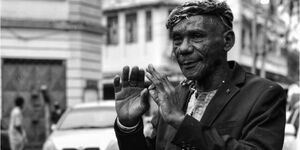What exactly is in a name?
Names go much further than the individual to whom they are attached. They tell stories of communities that no history book could compete with.
They draw pictures of glory and greatness that no artist could attempt to illustrate.
They’re passed from generation to generation in hopes of restoring, maintaining or creating a sense of honour.
Nonetheless, it would be superficial to assume that a person is defined solely based upon the merit of their name.
A name cannot define a person, but it can definitely give them depth. It would also be superficial to think that the name of a person is simply a depiction of that specific person and his or her own personal trials and triumphs in life.
Kenyan surnames and African names, in general, are a window into a particular ethnic group or relation to some form of African culture or geographical region.
Most African communities name their children in regards to events, character, seasons, place of birth, weather, mom’s situation at birth, time of birth among other factors.
These surnames possess a sense of tradition, unity, distinction, pride, and honour within the community, although there are still some people who feel the need to neglect their names.
These days, you will find people, mostly teenagers, and young adults, changing their names in order to avoid getting teased or ridiculed by peers who simply don’t understand the significance of their “weird” surnames.
Those who choose to change their names usually lean towards a more Western identity, not knowing that they are sacrificing respect for the very past that produced them.
Nevertheless, due to the tribal tensions that seem to flair up in Kenya every now and then, especially during election seasons, some people have opted to change their names to avoid ethnic profiling.
In this article, we have compiled a list of some of the most common surnames in Kenya and their meanings.
Maasai names
Barmasai (One who has killed or captured a Maasai)
Koinet (the tall one)
Leboo (born in the bush, outside the homestead)
Legishon (the polite one)
Lemayian (blessed)
Lemuanik (one from a large family)
Lolkerra (owner of many sheep)
Naengop (from a large place)
Sironka (the clean one, pure)
Kingasunye (chubby or fat)
Kiserian (the peaceful one)
Lankenua (lucky)
Naeku (born in the early morning)
Naimutiae (delayed, born in the evening)
Naipanoi (the big one, a large baby)
Naisiae (the hardworking, industrious one)
Nalangu (came from far, another tribe)
Nalutuesha (born or married when raining)
Namelok (the sweet one)
Namunyak (the lucky one)
Naserian (as Kiserian, the name implies ‘peace’)
Nataana (near, born of a neighbour)
Nkasiogi (the one who is always in a hurry)
Kalenjin names
Kipkorir (born shortly before dawn)
Kipkoech (born at dawn)
Kimutai (born in mid-morning)
Kibet (born at midday)
Kiplagat (Kiplangat) (born at sunset)
Kipkirui (born shortly after dark)
Kipkemboi (born at night)
Kipngetich (born when cows are taken to pasture after morning milking)
Kiprotich (born when cattle are brought home for evening milking)
Kipngeno (born when goats are waking up)
Kiprono (born when sheep or goats are brought into the house in the evening)
Kipkeino (born when sheep or goats are being milked i.e. when cows milk is short)
Kiplimo (born among grazing cattle)
Kipngeny (born when cattle are at a salt lick)
Kipkosgei (born after a long labor, or a long interval between children)
Kipchirchir (born in a hurry, after a short labor)
Kiptanui (fainted, failed to cry or breathe at birth)
Kipketer (born on the verandah)
Kipchoge (born near the grain storage bin)
Kipsang (born outdoors)
Kipkurgat--born by the door
Kibitok--born on the father's side of the hut, not the mothers
Kiptoo--born when visitors are around
Kiptum--born during circumcision ceremonies
Kimaiyo--born when beer is being brewed or drunk
Komen--born when beer is being brewed or drunk
Kipruto--born away from home, on safari
Kipchumba--born near white men, i.e. in a hospital, in a town, on a white-owned farm
Kipkemei--born during a drought
Kiprugut--born during a famine
Kiptalam--born during an infestation of locusts
Kipsigei--born on his own (i.e. the mother had no help)
Cheruiyot (male only)--born when everyone was asleep
Kitur--born after parents had begun to despair of having a child
Kigen--a long-awaited son (usually born after several daughters
Jepkorir--born shortly before dawn
Jepkoech--born at dawn
Jemutai--born in mid-morning
Jebet--born at midday
Jelagat (Jeplangat)--born at sunset
Jepkirui--born shortly after dark
Jepkemboi--born at night
Jepngetich--born when cows are taken to pasture after morning milking
Jerotich--born when cattle are brought home for evening milking
Jepngeno--born when goats are waking up
Jerono--born when sheep or goats are brought into the house in the evening
Jepkeino--born when sheep or goats are being milked (i.e. when cows milk is short)
Jeplimo--born among grazing cattle
Jepngeny--born when cattle are at a salt lick
Jepkosgei--born after a long labor, or a long interval between children
Jepchirchir--born in a hurry, after a short labor
Jeptanui--fainted, failed to cry or breathe at birth
Jepketer--born on the verandah
Jepchoge--born near the grain storage bin
Jepsang--born outdoors
Jepkurgat--born by the door
Jebitok--born on the father's side of the hut, not the mothers
Jeptoo--born when visitors are around
Jeptum--born during circumcision ceremonies
Jemaiyo--born when beer is being brewed or drunk
Jeruto--born away from home, on safari
Jepchumba--born near white men, i.e. in a hospital, in a town, on a white-owned farm
Jepkemei--born during a drought
Jeprugut--born during a famine
Jeptalam--born during an infestation of locusts
Jepsigei--born on his own (i.e. the mother had no help)
Cheruiyot (most male name only)--born when everyone was asleep
Jekigen--a long-awaited son (usually born after several daughters
Chepkorir--born shortly before dawn
Chepkoech--born at dawn
Chemutai--born in mid-morning
Chebet--born at midday
Chelagat (Cheplangat)--born at sunset
Chepkirui--born shortly after dark
Chepkemboi--born at night
Chepngetich--born when cows are taken to pasture after morning milking
Cherotich--born when cattle are brought home for evening milking
Chepngeno--born when goats are waking up
Cherono--born when sheep or goats are brought into the house in the evening
Chepkeino--born when sheep or goats are being milked (i.e. when cows milk is short)
Chelimo--born among grazing cattle
Chepngeny--born when cattle are at a salt lick
Chepkosgei--born after a long labor, or a long interval between children
Chepchirchir--born in a hurry, after a short labor
Cheptanui--fainted, failed to cry or breathe at birth
Chepketer--born on the verandah
Chepchoge--born near the grain storage bin
Chepsang--born outdoors
Chepkurgat--born by the door
Chebitok--born on the father's side of the hut, not the mothers
Cheptoo--born when visitors are around
Cheptum--born during circumcision ceremonies
Chemaiyo--born when beer is being brewed or drunk
Cheruto--born away from home, on safari
Chepchumba--born near white men, i.e. in a hospital, in a town, on a white-owned farm
Chepkemei--born during a drought
Cheprugut--born during a famine
Cheptalam--born during an infestation of locusts
Chepsigei--born on his own (i.e. the mother had no help)
Cheruiyot (male only)--born when everyone was asleep
Chepkigen--a long-awaited son (usually born after several daughters
Kikuyu names
Gacoki - one who returns
Gakere- muscular
Gakuru- elderly one
Gatete- a milk gourd
Gathee- elderly one
Gathii- a wanderer
Gathoni- She is an in law
Gathoni- she is an in law
Gatimu- a spear
Gethii- wanderer
Gichinga- a firebrand
Gicicio- mirror
Gikuyu- Founder of the Agikuyu na
Githinji- a butcher
Gitonga- wealthy one
Hiuhu- he is hot
Ikinya- a single step
Iregi- a rebel
Irungu- makes right reformer
Ita- a war raid
Itimu- a spear
Jata- star
Jomo- burning spear
Kagai- the divider
Kagunda- of the land
Kahiga- a rock
Kairu- black one
Kamau- quiet warrior
Kanja- from the outside
Kanoro- sharpens the sword
Karani- aide secretary
Karega- a rebel
Kariuki- born again
Kariuki- a child reincarnated
Kiambiroiro- mountain of blackness
Kianjahe- mountain of beans
Kiano- the wizards tools
Kianyandaarwa- mountain of hides
Kiara- a finger
Kihara- a bald patch
Kihiga- rock
Kimathi- Kenyan freedom fighter
Kimotho- the left hand (left hande
Kinoro- sharpener of knives
Kinyua- one who drinks
Kioi- bears heavy burdens
Kioni- she who sees
Kioni- she finds (sees things)
Kirimi- a farmer
Kirinyaga- mountain of brightness (i
Kithingi- a butcher
Koigi- one who speaks
Kuguru- a leg
Macaria- seeker
Maina- a father of the Agikuyu
Maitho- eyes to see with
Makena- happy one
Mathaathi- name of an age-group
Matu- the clouds
Maundu- things ie different thing
Mbogo- buffalo
Mbui- grey hairs
Miano- wizards tools
Migwi- arrows
Mokabi- of the Maasai people
Mugendi- guests passersby
Mugi- wise one
Mugo- prophet
Muiru- black one
Mukami- a milk maid
Mukami- a milk maid
Mukanda- strong cord
Mukiri- silent one
Mukondi- a dancer
Mukondi- a dancer
Mukuru- elderly one
Mumbi- creator or mother of the Agikuyu people
Munene- big great
Munoru- fat one
Muraguri- a seer
Murathi- a prophet
Muraya- tall one
Murigo- this is a load
Muriithi- a shepard
Murimi -a farmer
Muriu- son
Muriuki -one who is reborn
Muroki- comes with the dawn
Murugi- she cooks
Murugi- she cooks
Muruthi- lion
Mutahi- a raider
Mutegi- hunter trapper
Mutemi- king of the Agikuyu
Muthee- an elder
Muthemba- one of a kind
Muthengi- he move around
Mutheru- cleansed
Muthomi- a scholar
Muthoni- she is an in law
Muthoni- she is an in law
Muthuri- an elder
Mutira- a counselor or advisor
Mutiri- a counselor or advisor
Mutitu- a forest
Mutonyi- he enters
Mutua- reconciles differences
Muturi- a craftsman
Muugi- intelligent
Mwangi- seizes the nation victor
Mwara- inteligent
Mwarania- brings together negotiat
Mwaria- one who speaks alot
Mwenda- one who loves
Ndegwa- a bull
Ndemi- founders of the Agikuyu n
Nderu- bearded one
Ndwiga- a giraffe
Ngare- a leopard
Ngendo- a traveller
Ngigi- a grasshopper
Ngina- one who serves
Ngumo- fame
Njama- a council e g war counci
Njata- star
Njau- strong calf
Njeri- daughter of a warrior
Njiraini- on the road
Njiru- black one
Njogu- elephant
Njoki- she who returned
Njoki- she who returned (from th
Njora- a scabbard i e for a swo
Njururi- wanderer
Nyaga- brightness or Ostrich
Nyaguthii- a traveler
Nyakio- hard working
Nyakio- hard working
Nyambura- born of the rain
Nyambura- born of the rain
Nyamu- animal
Nyawira- hard worker
Nyawira- hard worker
Nyoike- stands alone
Nyokabi- of the Maasai people
Nyokabi- of the Maasai people
Riitho- an eye to see with
Ruguru- comes from the west
Ruhiu- sword
Runo- a fold
Waceera- wanderer
Wairimu- one of the nine founders
Waithaka- of the land
Waitherero- from the rivers flow
Waitimu- born of the spear
Waiyaki- famous leader of the Agik
Waiyaki- a great leader of the Agi
Wakiuru- one of the nine founders
Wakiuru- one of the nine founders
Wamai- come from the water
Wambui- singer of songs
Wamugunda- of the land
Wamuhu- born of ashes
Wamuhu- born of ashes
Wamuiru- dark skinned beauty
Wamuiru- dark skinned beauty
Wamwara- son of Mwara.
Wamweru- light skinned
Wangai- born of God
Wangari- a leopard
Wangera- a traveler
Wangombe- of the cattle
Wangondu- of the sheep
Wangu- she gathers the firewood
Wanja- the one from without
Wanjeri- born of Njeri
Wanjiku- one of the nine founders
Wanjiru- one of the nine founders
Waruhiu- bears a weapon always
Warui- come from the river
Waweru- born of the plains
Wokabi- she is of the Maasai
Luo names
Obong'o/Abong'o — only child
Atieno-born at night
Hera — love
Obama — twisting
Obiero/Abiero — born with the placenta (biero = placenta)
Obonyo/[Abonyo] — born during locust infestation (bonyo = locust)
Obura/Abura — born during a meeting (bura mean meeting)
Oburu/Aburu — born during a funeral (buru mean ash)
Obuo/[Abuo] — is a medicinal water plant
Ochanda/[Ochanda] — difficult birth (same for male and female)
Ochieng’/Achieng’ — born with the sun shining (born from about noon–2pm)) (chieng’ = sun)
Ochola/Achola — born after the father’s death
Odero/Adero — born during a during a period of abundance (dero = granary)
Odhiambo/Adhiambo — born in the afternoon (around dusk (3–6pm); born in the evening; born after sunset) (odhiambo = afternoon)
Odhon’g/Adhon’g — very old name; meaning "fist"
Odek – born when the mother had picked up traditional vegetables from farm
Odika/[Adika] — something that steps hard on the ground
Odinga – Luhya origin
Odiwuor/Adiwuor — born at night 11pm–2am. Similar to Owuor/Awuor
Odondi/[Adondi] — quarrelsome
Odongo/Adongo — second born of a twin pair
Odoyo/Adoyo — born during weeding
Oduol/[Aduol] — born in the father's house (Duol)
Oero/Aero — very old name; meaning "to love"
Ogola — born outside the house, just under the eave
Ogol — remove
Ogolo — striger weed
Ogot/[Agot] — born on a hill (especially if the mother had taken a walk not expecting the child to come)
Ogutu/[Agutu] — born next to the traditional Luo Ugali bowl (called Ogutu or Hagudu)
Oigo/[Aigo] — wrestle with
Ojwang’/Ajwang’ — born after father died
Ojuok — born by the intervention of a spirit (juok = spirit)
Okelo/Akelo — born after a pair of twins or the third born of triplets
Okech/Akech — born in famine
Okeyo/Akeyo — born at harvest time
Okinyi or Okinyo/Akinyi — born at dawn (born just after dawn (6am–10am); the male form is rare
Okomo/Akomo — born in prosperous times or during planting
Okongo/Akongo — born during celebration especially where alcohol brew is plenty
Okoth/Akoth — born during rainy season (koth mean rain)
Okumu/Akumu — mysterious birth (conception after birth, but before resumption of menses; kum = punition)
Okungu/[Akungu] — born during the outbreak of caterpillars, which was also an indication of impending bumpler harvest
Oloo/[Aloo] — equivalent to Adam
Oludhe/[Aludhe] — provoking, as the case of Peninah to Hannah in the Bible
Oluoch/Aluoch — born during a cloudy season
Omolo/Amolo — born around dawn (4–6 a.m.)
Omondi/Amondi — born around dawn (6-10am). mostly men used interchangeably with Akinyi for women
Okoka/[Anoka] — Luo for Enock
Ondiek – monster or a wild animal, especially the leopard
Oneko/[Aneko] — mad or wild
[Ong’ina]/Ang’ina — round
Onyango/Anyango — Born in the early morning (born before noon (10am–noon)
Ooko/Aoko — born out-of-doors (usually unintentionally)
Ooro/Aoro — born during dry season (oro = drought)
Opiyo/Apiyo — first born of a twin pair
Opolo/Apolo — very old name; meaning "heavenly"
Opondo/Apondo — born hidden (pregnancy was not visible)
Otieno/Atieno — born at night (7–11pm) (otieno = night)
Otiende/[Atiende] — Luhya origin
Ouma/Auma — infant delivered into a prostrate position on the ground
Owino/Awino — born with umbilical cord around the neck (born covered in meconium or caul)
Owiti/Awiti — thrown out (mother disowns infant for difficult birth as an apotropaic gesture)
Owuor or Odwuor/Awuor — born between midnight–2 a.m.
Oyange/Ayange — very old name; meaning "discovered"
Resa-Save me
Gor — was the "personal surname" of Gor K'Ogalo a famous Luo chief during the 19th century
Jalang'o — one who is spirited
Jow — buffalo
Magero — causing fearfulness
Majuma — Swahili origin (born on a Friday)
Muga — rhinocerous (the O is removed or corrupted)
Nyang'au — hyena (mostly used in Kisii)
Nyaoro — drought's daughter
Raila — Luhya origin (meaning One who tickles and causes laughter)
Ramogi — Luhya Origin (corruption of Luo for Lamogi — their style of worship)
Rao or Rawo — hippopotamus
Ogwang — wild cat
Ogweyo — lizard
Omire — Luhya origin (may represents the person’s origin)
Omuga — rhinocerous
Oronge — Kisii origin
Oruoch — Kisii origin (corruption of Oluoch, one born during fog of cloudiness)
Were — benevolent or philanthropic (attribute of God to Luhyas and Luos)
Lwanda Jawar — Peter (loosely translated to "Stone Savior")
Luhya names
Nasimiyu- girl born during the dry season
Naliaka- born during the weeding season.
Nafula- girl named after the rainy season.
Nanjala- born during the hunger or famine season
Natela-named after brightness and light.
Nyongesa- born on a Saturday
Wamalwa- born during the brewing season
Wanyonyi- born during the weeding season
Wafula- born during the rainy season.
Wanjala- boy name which means born during the famine season.
Wasike- baby boy who is born during the locust season.
Simiyu- born during the dry season.
Nabwire- girl who is born in the evening.
Nekesa- girl born during the harvesting season.
Nangila- born on a journey
Kamba names
Kasyoka - Reincarnation of a dead family member
Mbuku - Hare
Mumbe - Beautiful
Mumbua - Born during rainy season
Mueni - The new one
Mutuo - Born after a long duration gestation
Mwikali - Born after a long duration gestation
Nduku - Born at night
Nditi - Dog
Ndila - Billy goat
Wayua - Born during famine
Kioko - Born in the morning
Makau - Born during war time
Mbiti - Hyena
Munyambu - Lion
Mutongoi - Leader
Mutua - Born after a long duration gestation
Mutuku - Born at night
Musyoka/Musyoki - Reincarnation of a dead family member
Musili - Judge
Musumbi - King
Muthui - The rich one
Ngumbau - The brave one
Nzoka - Snake
Wambua - Born during rainy season
Kisii names
Makori (This name is given to a baby boy who has been born besides the road)
If it is a baby girl she will be named Nyanchera.
Barongo (This name is given to a baby who is born after the first twin)
The name is given to both boys and girls.
Nyaboke (The name means sweetness. Babies given this name are said to be born during the season when honey is in plenty)
Omariba (The name is given to babies born during the rainy and muddy season)
Kwamboka (A child born while the mother is crossing a river is given the name Kwamboka)
Sokoro (child born and named after his grandfather)
Mongina (girl named after a mother to her father or mother)
Omwancha (he loves people)
Onkwani (he talks a lots)
Nyathera (she survived)
Nyanjera (born on the way)
Nyachae (generous)
Muga (confident of one truth)
Kerubo (born on the plain)
Source: Namesite.com, Kipblog, Wikipedia, Kenyanames
Know some other Kenyan surnames that we haven't included? Please add the names and their meaning in the comment section below.












